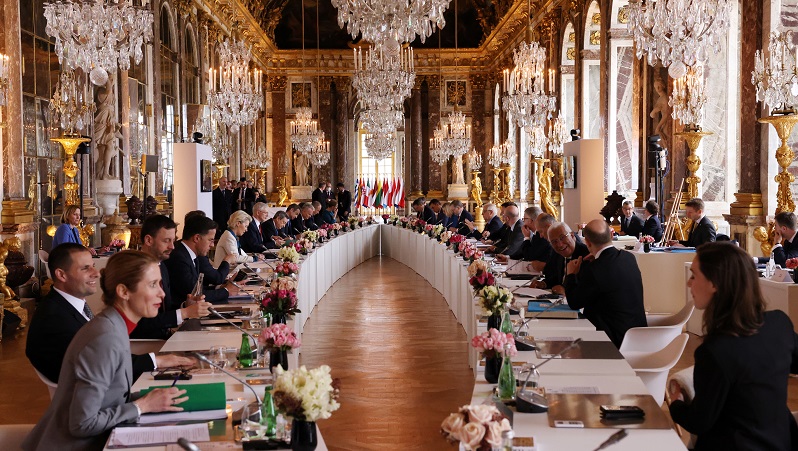EU heads of state meet in the Palace of Versailles, near Paris (Photo: European Union)
After a meeting of EU heads of state in Versailles, France, Commission president Ursula von der Leyen told a press conference: “By mid-May, we will come up with a proposal to phase out our dependency on Russian gas, oil and coal by 2027, backed by the necessary national and European resources.”
But the Versailles Declaration agreed by all 27 member states at the meeting does not reference the 2027 end date.
Euractiv reported ahead of the summit that Poland was staunchly advocating for all-out sanctions on Russian energy. Germany, Hungary, Bulgaria and Finland were opposed.
Arriving for the talks, Finland’s prime minister Sanna Marin said: “It’s a very difficult situation that on the one hand we have these financial sanctions that are very hard but on the other we are purchasing oil, gas and other fossil fuels from Russia.”
Earlier in the week, the Commission called on member states to decrease their use of Russian gas by two-thirds this year. Instead, it urged investment in renewables, energy efficiency and non-Russian gas.
Analysts at the Centre for Research on Energy and Clean Air estimate the EU has bought €9 billion ($10bn) worth of fossil fuels from Russia since it invaded Ukraine and counting (see live updates below).
Reacting to the announcement, Ukraine’s deputy environment minister Irina Stavchuk said: “Every day the EU pays hundreds of millions of euros to Putin’s regime for gas. It fuels Russia’s ability to continue the aggression. That is why we call on our international partners to impose [an] embargo on oil and gas from Russia, timber and wood products, and other materials.”
For Oleg Savitsky, of the Ukrainian environmental NGO Ecoaction, 2027 is too late to wean Europe off Russia’s fossil fuels. “I think what really matters now,” he said, “when the Russian army is killing pregnant women in Mariupol and shooting at evacuation convoys, is immediate action not a plan by 2027.”
Under the declaration, member states agreed to phase out the use of Russian fossil fuels “as soon as possible” by “accelerating the reduction of our overall reliance on fossil fuels”.
The caveat “taking into account national circumstances and member states’ choices of their energy mix” was added since a draft seen by Climate Home dated Tuesday.
During the talks, member states also added text on “developing a hydrogen market” and “providing LNG infrastructure” to boost the block’s energy security. Von der Leyen said the EU wants “a lot more LNG coming” to its shores.
“Whatever we do with the LNG gas, the pipelines can one day be used as infrastructure for hydrogen so it’s a perfect transition,” she added.
LNG is methane gas which has been turned into a liquid so that it can be transported on ships and trucks. It can come from overseas exporters like the US, Qatar and Algeria.
Global Witness gas campaigner Tara Connolly told Climate Home that building gas terminals and pipelines “would seriously undermine plans for energy independence, further locking in expensive, climate-wrecking fossil gas”.
She added that “the idea that LNG terminals can be converted to import hydrogen is demonstrably false”.
E3G hydrogen expert Eleonora Moro told Climate Home that pipelines often need expensive upgrades to carry hydrogen and that their routes are often differ from those needed for hydrogen.
